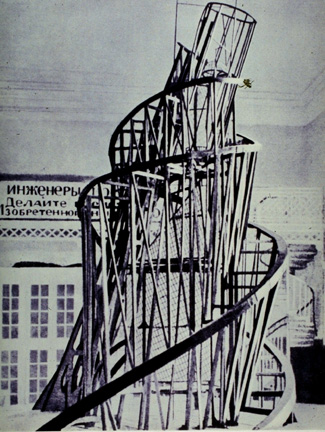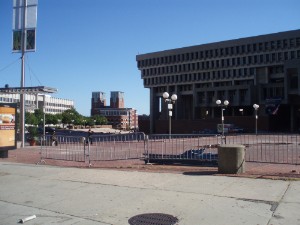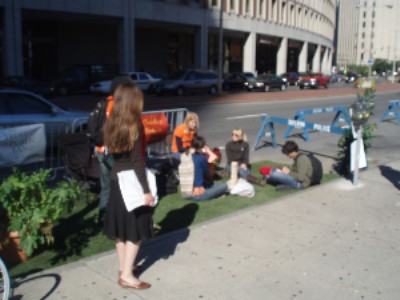I've always wanted, but never quite had the cred, to go to Burning Man. Instead, I went to this year's rendition of National Park(ing) Day in the hopes that it would provide a reasonable, if diminuative, substitute in temporary parks across the country. Creative minds can do a lot with 180 square feet, especially when there are straight-laced passers-by to shock and paradigms to subvert.
in the hopes that it would provide a reasonable, if diminuative, substitute in temporary
parks across the country. Creative minds can do a lot with 180 square
feet, especially when there are straight-laced passers-by to shock and
paradigms to subvert.
rather by an art collective, and there's something delicious about the marriage of art and asphalt. I imagine that many
of the over 400 events that took place last week (about double that of
last year) included all sorts of crazy stuff, in addition to more
mundane but well meaning patches of sod and picnic chairs. There were
probably DJs, acid trips, and naked fire eaters in San Francisco, where
Rebar founded the first event in 2005, and perhaps equal measures of whimsy took place at the two-dozen events in Los Angeles and New York (which is, as we know, the capital of the creative economy).

Tatlin's unbuilt Monument to the Third International in front of a Starbucks.)
despite its historic, pedestrian-friendly streetscape, the nation's tenth-largest
metro area had all of one Parking Day event. The venerable Trust for
Public Land helped coordinate the national Parking Day effort with a
list of cities and a handy map, and they were the official sponsor of
Boston's site, strategically located in front of what is generally
considered one of the most atrocious public spaces in all the United
States: Boston City Hall and its plaza, which is the most dehumanizing
expanse of pavement I've seen since Tienamen Square.

that their rendition in Boston was a bit too corporate. TPL saw fit to get permits and official police barriers
as would any regular group of demonstrators outside of City Hall, which
is all well and good. Their name is on the event, and they need to keep
the city happy (even while implicitly pointing out its shortcomings).But for most of the time I was there, the participants -- a pleasant bunch of students and urbanists -- outnumbered the onlookers. A scene, it was not.

reclaiming ugly spaces, or any public space, is that it doesn't have to be sanctioned, nor
should it priviledge only one kind of use. For the right number of
quarters, any citizen can lay claim to those 180 square feet -- for a
car, a park, or anything else -- without adhering to convention. To get Bostonians -- or most people, for that matter -- to
understand the potential to reclaim, redesign, and repurpose the urban
landscape into something a little more human is going to require
something a bit more revolutionary than sod, potted plants, and swapped
stories of compost and grad school.
Vladimir Tatlin had in mind, but it may yet require a revolution.

Planetizen Federal Action Tracker
A weekly monitor of how Trump’s orders and actions are impacting planners and planning in America.

Chicago’s Ghost Rails
Just beneath the surface of the modern city lie the remnants of its expansive early 20th-century streetcar system.

Amtrak Cutting Jobs, Funding to High-Speed Rail
The agency plans to cut 10 percent of its workforce and has confirmed it will not fund new high-speed rail projects.

Ohio Forces Data Centers to Prepay for Power
Utilities are calling on states to hold data center operators responsible for new energy demands to prevent leaving consumers on the hook for their bills.

MARTA CEO Steps Down Amid Citizenship Concerns
MARTA’s board announced Thursday that its chief, who is from Canada, is resigning due to questions about his immigration status.

Silicon Valley ‘Bike Superhighway’ Awarded $14M State Grant
A Caltrans grant brings the 10-mile Central Bikeway project connecting Santa Clara and East San Jose closer to fruition.
Urban Design for Planners 1: Software Tools
This six-course series explores essential urban design concepts using open source software and equips planners with the tools they need to participate fully in the urban design process.
Planning for Universal Design
Learn the tools for implementing Universal Design in planning regulations.
Caltrans
City of Fort Worth
Mpact (founded as Rail~Volution)
City of Camden Redevelopment Agency
City of Astoria
City of Portland
City of Laramie






























